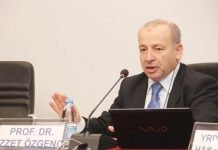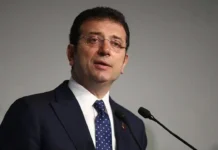Turkish autocratic President Recep Tayyip Erdoğan made the first visit by a Turkish president to see the Pope in the Vatican in 59 years on Monday as Rome was put under heavy security measures for fear of violent demonstrations. During the 50-minute audience Pope Francis gave Erdoğan a medallion embossed with an angel strangling a “demon of war,” a symbol of peace and justice.

According to a report by Reuters, Erdoğan’s motorcade entered a virtually deserted St. Peter’s Square after the streets that are usually bustling with tourists were closed due to security fears. A small, authorized demonstration of Kurds and their supporters was held outside nearby Castel Sant‘Angelo, a fortress on the banks of the River Tiber.
Some 3,500 police and security forces were on duty in Rome and authorities declared a no-go area for unauthorized demonstrations that included the Vatican, Erdoğan’s hotel and Italian palaces where he is meeting the president and prime minister. Anyway, scuffles broke out between police and demonstrators nearby.
Police, who put much of the center of the city under lockdown for the visit, said two people were detained after demonstrators tried to break through cordons to get closer to the Vatican from an authorized protest several blocks away.
Erdoğan said before he left Turkey that he would discuss the Middle East situation and Jerusalem in particular. The Vatican was due to issue a statement about the meeting later. Both Erdoğan and Pope Francis are opposed to US President Donald Trump’s decision to recognize Jerusalem as the capital of Israel, which many US allies say could doom Middle East peace efforts..
Erdoğan, returning a visit made by the pope to Turkey in 2014, spoke privately with Francis for about 50 minutes in the pontiff’s frescoed study in the Vatican’s Apostolic Palace, which he uses mostly for ceremonial purposes.

The public part of the meeting, with reporters and Erdogan’s entourage, was cordial, although both men seemed stiff at the start while seated at the pope’s desk before journalists were ushered out.
Matteo Salvini, head of Italy’s anti-immigrant Northern League, said in a tweet that it was “shameful” that the government was receiving Erdoğan, calling him “the head of a bloody, freedom-killing Islamic regime.”
Among Erdoğan’s delegation was the Mehmet Pacaci, Turkey’s ambassador to the Vatican. Erdoğan recalled Pacaci to Turkey in 2015 when Francis became the head of the Roman Catholic Church and called the 1915 killing of as many as 1.5 million Armenians “genocide” – something Turkey has always denied. The ambassador stayed away for nearly 10 months.

The report has underlined that Erdoğan who often spews hate speech against Christians, particularly Vatican, continues to stigmatize millions of people in Turkey and around the world with his systematic and deliberate campaign of churning hostility against Christians. His propaganda machinery amplifies this hateful narrative and the mass media under Erdoğan’s control spread it further to a larger audience.
SCF had reviewed Erdoğan’s public speeches delivered in recent years to uncover the pattern as well as campaigns run by his associates in politics and media. Turkish president openly ruled out an interfaith dialogue between Islam and Christianity, branded the European Union as group of infidels led by the Pope, and even accused the United Nation Security Council as representing only Christian nations.
The unrelenting attacks against the Holy See, especially the Pope, often came out when Erdoğan bashed and tried to bully his opponents whether that would be Fethullah Gülen, the US-based Muslim scholar and major critic of Erdoğan or countries like Germany and the Netherlands when he was prevented to run political campaigns for diaspora Turks.















